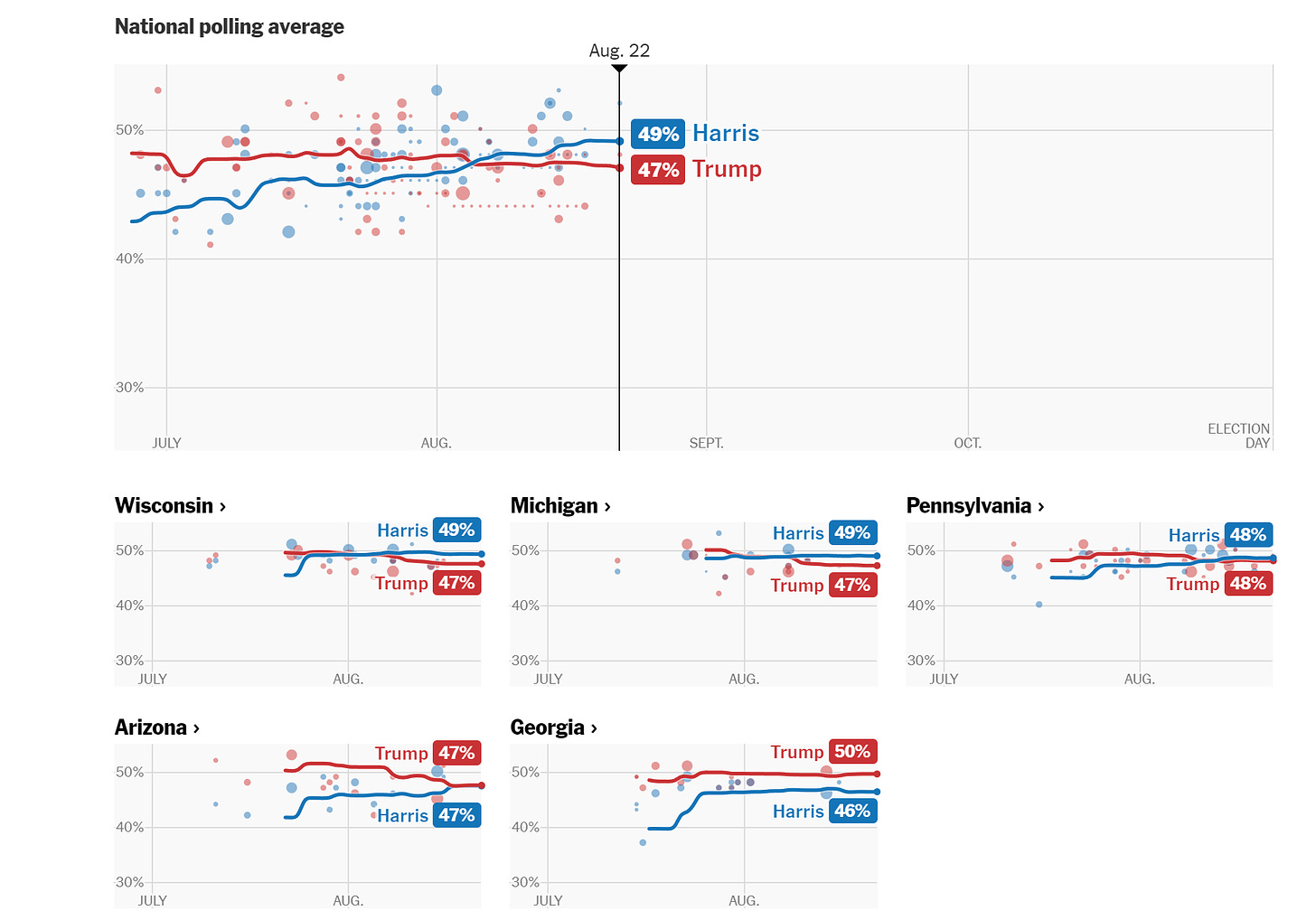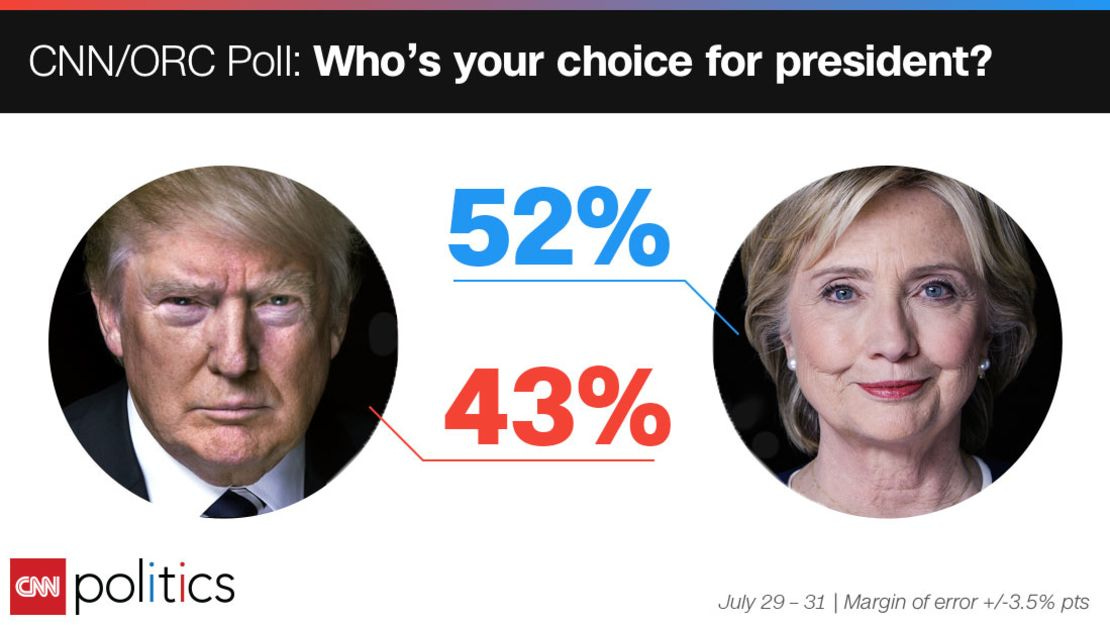Let’s start with the caveat that all of these numbers have likely moved meaningfully in Harris’s direction due to the convention, but convention bounces usually fade.
Above is the latest polling breakdown from the New York Times. As you might notice, it does not currently project a Kamala Harris victory! She’s leading at the national level, but as everyone suddenly forgot in 2016, the United States does not have a national popular vote system. She’s leading in two of the three “blue wall” states, but the outcomes are within the margin of error, and most paths to victory require her to carry all three. She’s tied in Pennsylvania and Arizona. The only state here where a lead exceeds the margin of victory is Georgia, which favors Donald Trump. If Harris’s recent gains regress back to this state of affairs in the coming months, it’s a coinflip election where Trump could easily squeak out victory in Pennsylvania and Arizona and regain the White House. That’s not some wild hypothetical! It’s an entirely plausible state of affairs! Much more plausible than Trump winning in 2016, where it took Hillary’s wild unpopularity, Robby Mook’s incompetence, and decades-long indifference among Democrats towards the collapse of the Rust Belt. This election is very, very close.
And yet this current state of affairs has produced some of the most wildly unrestrained football-spiking and expressions of certainty that I’ve seen in 24 years of following presidential elections. Matt Yglesias’s piece today - which continues his genuinely sad collapse into just pure anti-left bitterness - is more or less a declaration of victory. The entire crew at New York magazine is rabidly invested in the notion that Harris’s victory is assured, to the point where I doubt anyone affiliated with the magazine would be able to get real sustained skepticism into its pages. (And if you did the company Slack would call you a fascist.) The stentorian New York Times has been having a month-long collective orgasm about what’s happening, seeming to drop even the tattered fig leaf of impartiality, which until recently they’ve still pretended to embrace. Social media is stuffed with gloating, gleeful overconfidence about Harris’s coming victory. Democrats are not playing defense with their emotions, here, which is absolutely bonkers to me considering what happened just eight years ago.
Look, I’m very willing to say that Harris has a real but fragile lead. Certainly I would bet money on a Kamala victory if you forced me to pick, and I’d feel OK about it. I also obviously very much prefer a Democratic victory, even as I am aware that a) the party is corrupt and in thrall to moneyed interests and b) an actual Harris presidential administration is going to be an endlessly tiring slog where Congressional Republicans stifle anything she tries to do. (Never forget that conservatives are better at being the opposition party, and clearly enjoy being the opposition party more, no matter how much they wail about presidential election results.) Yes, Harris should be assumed to have a narrow lead in a very tight election. But… that’s not what people are talking about. Everyone is losing their goddamn minds. So much of the ambient political conversation suggests that Democrats sincerely believe this election has become a coronation.
And it’s an absolutely classic demonstration of how American liberals simply cannot process politics as anything other than psychodrama. They’ve viewed the Trump years as uniquely traumatic, even though George W. Bush was a vastly more destructive president than Trump. (But he ruined lives with class, so he’s less bad than Trump.) Trump lost in 2020 - I assure you, Joe Biden is currently president - but the news cycle has been discouraging and they dream of that night everybody made out in the rain in that park in Chicago in 2008, right before Obama ruled for eight years as a center-right president who liked to kill children with drone strikes. When they’re listening to Wait Wait Don’t Tell Me! in the shower in the morning they think “Kamala has to win,” and because they’re children of privilege they’re incapable of separating that emotional need for her to win from the possibility that she very well might not. Democrats will do anything to win, except what’s most important and most necessary for the party - to become ruthlessly hard on themselves, to be serious, to stop treating politics as ruling class Pokemon. But they don’t want to get serious. They want to spend the rest of their lives pretending that meme politics can save the country. But what if winning requires you to stop acting like a middle-aged teenager?
Once again, I lament the way that seriousness and pragmatism are coded as centrist, in this country, despite the fact that the American electorate is not in any meaningful or coherent sense centrist. (“Protect Social Security and Medicare and spend more on science and education and expand defense spending and cut my taxes and balance the budget” is not centrism.) The point is not that vibes don’t exist or don’t matter; they both exist and matter in politics. What’s serious and pragmatic is understanding that material conditions are the bedrock on which vibes grow. Biden’s age was clearly a huge impediment to his reelection chances, but the issue that has done the most to dictate the progress of this election is inflation, how much stuff costs, which is as material and concrete and visceral as political issues get. The fact that it’s slowed down so much recently makes Democratic victory possible. That presidents can’t control inflation just speaks to the unfortunate irrationality that underlies the system. What I can tell you for sure is that the low information Pennsylvania retirees who will determine the outcome of the election won’t vote based on who’s brat. And I am growing more and more frustrated with the number of educated progressives who respond with resentment and insult if you ever tell them, hey, maybe we should get actually serious for a little while and drop the fucking exhausting meme fixation.
Look -
Donald Trump has significantly outperformed polling in two consecutive presidential elections
The Electoral College favors the Republicans
Eventually, Kamala has to make her case in an unscripted and adversarial format, which she proved entirely incapable of doing in the 2020 primary
There’s still more than two months to go
Harris is doing better than I would have possibly thought a month or so ago. For that I’m very grateful. I feel increasingly hopeful about the election, and I hope to go the good news continues. But you all lived through Trump winning an election that you were certain he would lose. Did you repress those memories? Come on, guys. It was two Olympics ago.
I don’t get it, folks.






DeBoer: "Matt Yglesias’s piece today - which continues his genuinely sad collapse into just pure anti-left bitterness - is more or less a declaration of victory."
Yglesias:
"My sense is the vibesologists see the candidate swap as the ultimate vindication of vibes theory, but my view is that while it certainly underscores the importance of vibes, it also shows their limits.
"After all, if you look at the current state of the campaign, the Harris Vibes are immaculate while the Trump Vibes are bad.... But the actual polls and election odds are just okay for Democrats. They’re not bad — Harris is winning — but they’re not great. Harris’ polling lead is smaller than Biden’s in 2020 or Hillary’s in 2016, and Democrats are on track to lose the Senate. The vibes have swung much more than the polling, ..."
That doesn't look like a "declaration of victory." That looks like, "Things are promising, but ..."
While people will point to Hillary forevermore, my understanding from studies I read long ago (and unfortunately do not have links to) is that generally an impression of being the frontrunner helps win elections nine times out of ten. That is to say, being confident in victory is more predictive of electoral success in close races than the whole "fight like you're ten points behind" spiel, which actually demotivates voters.
This is for two reasons.
1. Those who are on the fence between supporting a candidate and not voting are far more likely to turn out if they think their candidate of choice is going to win. This is because for a lot of people, voting is a form of psychological labor, and they don't want to get invested in the process if they think their candidate of choice (and them, by proxy) will be defeated.
2. As weird as it sounds, the last few percentage points of undecided voters often seem to want to "pick the winner" through the bandwagon effect at the end of the race. They don't have strong feelings about either candidate or about policy in general, they just want to be sure they didn't make the wrong choice.
Given all of this, I don't think projecting confidence in victory is a bad thing, provided you still, you know, work your ass off in the campaign. And there's no sign that the Harris/Walz team is going to let up there. So I'm not sure what realism here achieves.